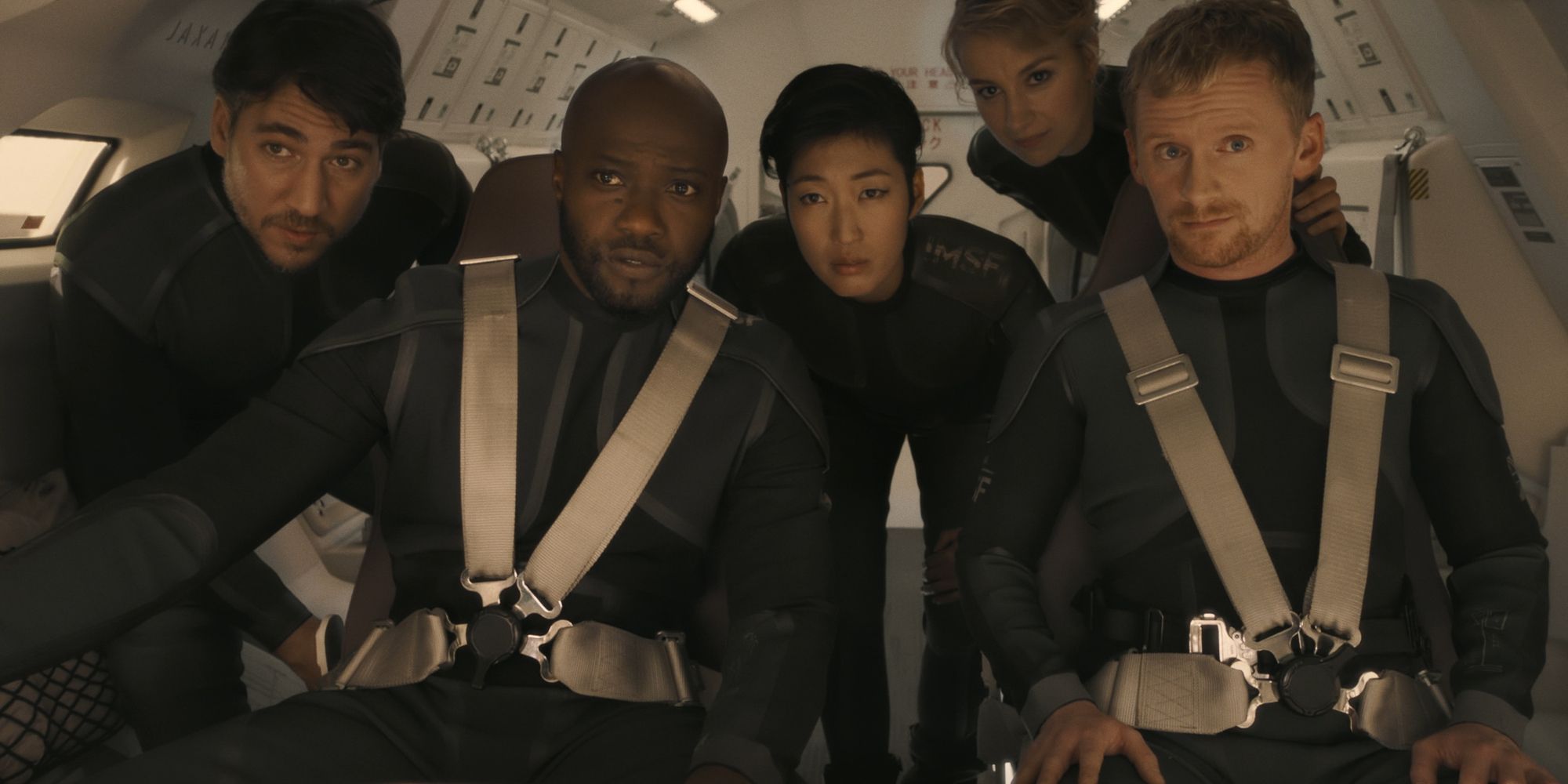As scripted television series go, Nat Geo’s Mars really is unlike anything else on television. Not only is it a straightforward, grounded look at what a potential human colony on Earth’s planetary neighbor might look like, but it also offers viewers something more. That being the interviews with experts, scientists, and others who have thought long and hard about what it would take to get humans on the Red Planet, and just how feasible it is for the barren landscape to eventually support human life. Moreover, while the Big Thinkers are busy sharing their knowledge and expertise on humankind’s next step into the solar system, the show’s narrative is busy asking the next logical question: Who gets to claim Mars, and what happens when the profit-seeking private industry runs headlong into scientific research that’s there, presumably for the greater good?
The series moves forward in time five years from the season 1 finale to 2042, when the IMSF colony on the planet, Olympus Town, is stable and, you might say, flourishing. Though they’re a long way from making Mars truly habitable, the process to terraform the planet has begun in earnest, but, as one might expect, the cost of such an endeavor is so great that financial help from the private sector is required. Enter Lukrum Industries, which sends a coalition of miners to the Red Planet with the intention of laying its money-grubbing hands on all those untapped resources before anyone else can. The result is a new series of challenges for the original IMSF mission team, as they are forced to share scarce resources like water with a group that refuses to recognize boundaries or to respect the original goal of the Mars mission.
More: Sally4Ever Review: Admirably Takes Cringe Comedy To The Point Of Exasperation
Heading up the Lukrum Industries side of things are series newcomers Jeff Hephner (Boss, Chicago Med), and Esai Morales (Ozark). Though the pair are 34 million miles apart, they ostensibly serve the same function, largely because they serve the same master: capitalism. The arrival of Lukrum Industries is about as ominous for the IMSF crew as possible, when the landing spacecraft sprays the colony with debris and nearly kills mission commander Hana Seung (Jihae), setting off a tense series of confrontations between the miners and the scientists.
The dueling interests of Lukrum and the IMSF creates a fascinating conflict for the second season, one that is supplemented by the documentary aspect of the series, as the Big Thinkers apply their respective knowledge to the realities of something as monumental as humankind colonizing a new planet. In the season premiere, the Big Thinkers are tasked with wrapping their heads around the notion that Mars is going to look pretty enticing to industrial concerns looking to appease stock holders by promising untold profits from all the resources just waiting to be mined by companies like Lukrum. And, to the credit of Mars, the show looks at the prospect of private industries aiming to turn a profit from the perspective of the people who work for them.
With interviews ranging from Neil deGrasse Tyson to Elon Musk to Michio Kaku to The Martian author Andy Weir, the premiere examines the drive to explore and how that compares to the drive to make a buck. The episode does this by demonstrating the conditions and lifestyles of the individuals working on a massive oil rig in the Arctic. These employees work 12-hours a day for 3-week intervals to support their families. The documentary side of the series takes these concerns seriously and is careful to mention that the people working there are doing so for reasons all viewers can relate to. It’s an interesting approach that deliberately distances the audience from those ultimately profiting the most from such practices.
Essentially, everyone tends to agree that if humans can see a profit in going somewhere, they’re going to find a way to get there, for better or for worse. That’s one of the big themes in Mars season 2, which repeatedly references the role the “entrepreneurial spirit” plays in things like building communities. That’s all well and good, but when the oil industry spends millions of dollars to influence elections and prevent the passing of a state initiative that would’ve compelled it to reduce carbon emissions, it becomes exponentially harder to paint such entrepreneurialism in a positive light. The scripted element of the series seems to pull its punches a little less in that regard. In particular, Hephner’s mission commander is a brash individual whose ongoing conflict with Commander Seung stands to make things rather interesting this season, especially when neither show nor actor has any qualms painting Lukrum as the invasive species on the Red Planet.
Thankfully, there’s more to Mars season 2 than just the negative effects of for-profit industries getting involved in helping humankind colonize the solar system. The show also includes some interesting threads regarding just how long human beings can feasibly be away from Earth before the physical, emotional, and psychological toll becomes too much. In particular, the relationship between Javier Delgado (Albert Amman) and Amelie Durand (Clémentine Poidatz) comes to a head early on, when the latter simply cannot be on the Red Planet any longer. The addition of these personalized storylines helps bridge the gap between Nat Geo’s typical edutainment and its efforts to bring in more traditional scripted drama. Mars has proven surprisingly adept at both in its first season, and in season 2 it looks as though the series will build upon that initial success in fascinating new ways.
Next: Patriot Season 2 Review: An Eccentric Spy Tale Brilliantly Mixes Melancholy & Humor
Mars season 2 continues next Monday with ‘Worlds Apart’ @9pm on National Geographic.



